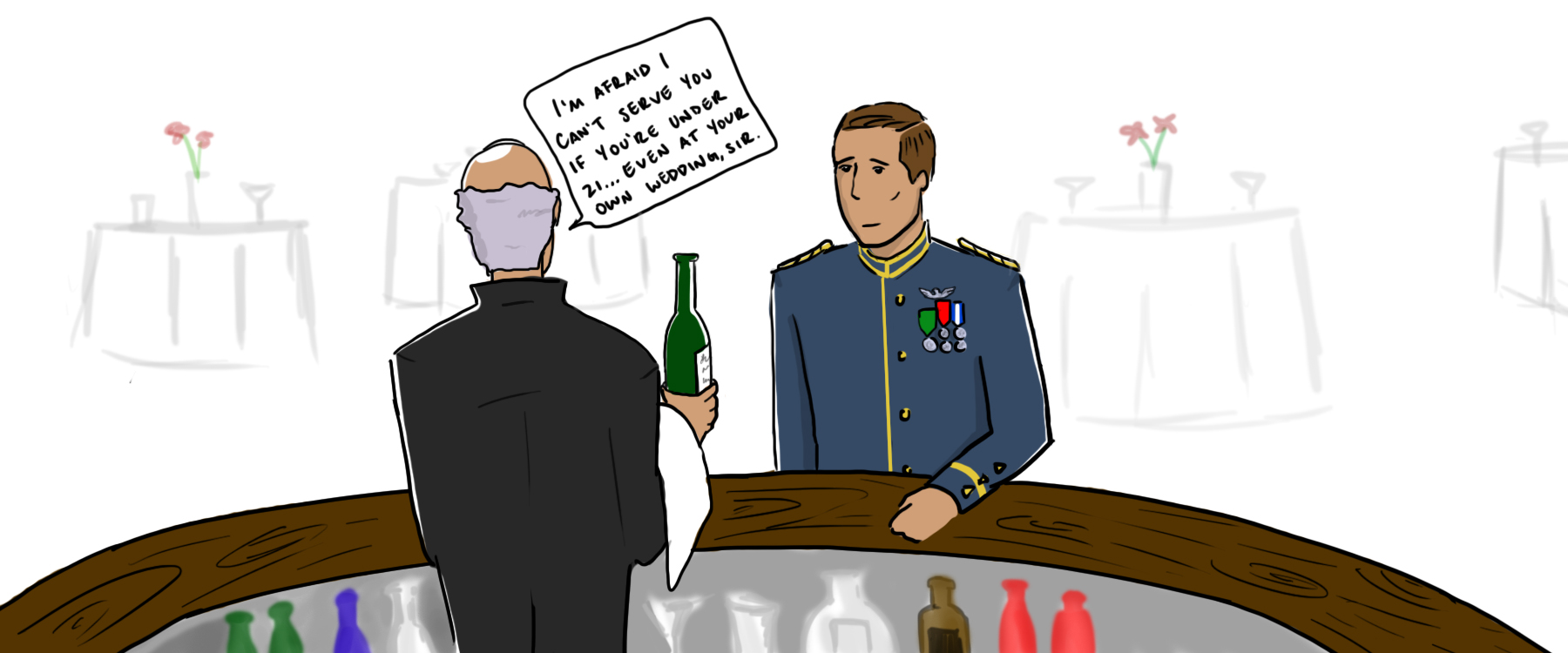Show me a college student who wants the drinking age lowered, and I’ll show you a college student.
I think it’s reasonable to assume that many of us here at William and Mary believe that the age of 21 is rather arbitrary on allowing consumption of alcohol. The justifications for such a viewpoint are varied. Perhaps a minor yet awkward altercation with some member of law enforcement brought the issue to your attention, or maybe a late-night epiphany in some sound-proofed (but still kinda sketchy) raternity house basement about the curiosity of one’s circumstances convinced you on the issue. Whatever brought you here, remember this:
You can have a well-reasoned and mature argument for lowering the drinking age. And hopefully, it would sound something like this.
Perhaps the greatest problem pertaining to the drinking age of 21 is the age of 18. At the age of 18, one becomes a legal adult. I personally recall filling out a little card known as my draft card should there ever be a time that Uncle Sam comes calling for me to take up arms. Or tanks, or artillery shells, or drones, or a position on a submarine with nuclear missiles just chilling inside — I would have a job involving these weapons. Yes indeed, the U.S. government believes that I am more qualified to handle machine guns, tanks and whatever else Uncle Sam keeps locked in his arsenal than a single can of watered-down light beer. There seems to be a slight disconnect in this thinking.
However, this hypothetical pales in comparison to the reality. We have soldiers deployed around the world willing to give their lives in the defense of this nation who are forbidden by law to celebrate the Fourth of July with a beer and a fishing trip, and would face charges by the police if they chose to do so. That is just wrong. Even if the drinking age is kept at 21, there should be an exemption made for military service.
And there are additional problems. When most students find themselves out of Mom and Dad’s house for the college years, they immediately take their newfound freedom and celebrate with parties featuring alcohol as the main attraction. Why? Because it’s impossible to get elsewhere; these parties are often a nightly occurrence and easily accessible to students. These parties, due to their illegal nature, often happen in secluded areas out of the public view, and not surprisingly, these are the same types of areas where sexual assault is more likely to occur. Such a clandestine environment does not exactly foster healthy habits; 96 percent of the alcohol consumed by 18-20 year olds is via binge drinking, according to a John Hopkins Bloomsburg School of Public Health study in July 2011.
It also bears repeating that the drinking age at 21 is actually a law. In 2005, a study by Monitoring the Future found that 80 percent of high school seniors had tried alcohol. These students go on to college and break the drinking law, a law that has only been in place since 1984. The same John Hopkins study found that 48 percent of the alcohol consumed in college is by underage students. As to why this matters, breaking the drinking law fosters a disregard for the law, because ignoring this law has become normal. This isn’t exactly the best way to instill good citizenship.
So what’s the solution? Besides alcohol (to all my chemistry nerds out there).
What if having a high-school diploma or being 19 became the new 21? It could work. We already have to show our licenses at bars; I’m sure some college freshmen wouldn’t have a problem with carrying some proof of graduation as well. Certainly not all Americans receive a high-school diploma, but such a requirement would at least keep the alcohol out of the high school hallways. With the alternative age of 19 also applied, then those who don’t receive diplomas could still hang out at the bar two years earlier than they currently do.
Good intentions led to the drinking age of 21. But good intentions don’t mean good policy; it’s time for a change.
Email Sumner Higginbotham at sshigginbotham@wm.edu.





































[…] A fight for a safe, yet fair drinking age – Perhaps the greatest problem pertaining to the drinking age of 21 is the age of 18. At the age of 18, one becomes a legal adult. I personally recall filling out a little card known as my draft card should there ever be a time … […]
[…] A fight for a safe, yet fair drinking age – Perhaps the greatest problem pertaining to the drinking age of 21 is the age of 18. At the age of 18, one becomes a legal adult. I personally recall filling out a little card known as my draft card should there ever be a time … […]
[…] A fight for a safe, yet fair drinking age – Perhaps the greatest problem pertaining to the drinking age of 21 is the age of 18. At the age of 18, one becomes a legal adult. I personally recall filling out a little card known as my draft card should there ever be a time … […]